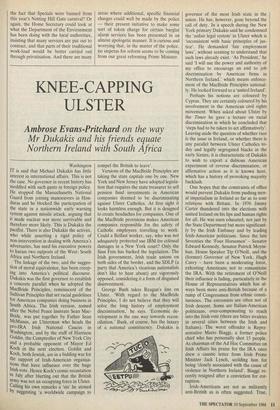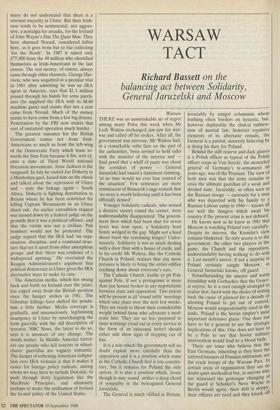KNEE-CAPPING ULSTER
Ambrose Evans-Pritchard on the way
Mr Dukakis and his friends equate Northern Ireland with South Africa
Washington IT is said that Michael Dukakis has little interest in international affairs. This is not the case. No governor in recent history has meddled with such gusto in foreign policy. He stopped the Massachusetts National Guard from joining manoeuvres in Hon- duras and he blocked the participation of the state in a nationwide early warning system against missile attack, arguing that It made nuclear war more survivable and therefore more likely. This is Dukakis the pacifist. There is also Dukakis the activist, who while asserting a rigid policy of non-intervention in dealing with America's adversaries, has used his executive powers to harass two outposts of the West: South Africa and Northern Ireland.
The linkage of the two, and the sugges- tion of moral equivalence, has been creep- ing into America's political discourse. Dukakis was the first governor to establish a concrete parallel when he adopted the MacBride Principles, reminiscent of the Sullivan Principles that set racial guidelines for American companies doing business in South Africa. The Irish version, named after the Nobel Peace laureate Sean Mac- Bride, was put together by Father Sean McManus, an Ulsterman who heads the pro-IRA Irish National Caucus in Washington, and by the staff of Harrison Goldin, the Comptroller of New York City and a probable opponent of Mayor Ed Koch in the next election. Goldin and Koch, both Jewish, are in a bidding war for the support of Irish-American organisa- tions that have influence over the huge Irish vote. Hence Koch's comic recantation in July after blurting out that the British army was not an occupying force in Ulster. Calling his own remarks a 'sin' he atoned by suggesting 'a worldwide campaign to compel the British to leave'.
Versions of the MacBride Principles are taking the state capitals one by one. New York and New Jersey have adopted legisla- tion that requires the state treasurer to sell pension fund investments in American companies deemed to be discriminating against Ulster Catholics. At first sight it looks harmless enough. But it is designed to create headaches for companies. One of the MacBride provisions makes American companies responsible for the safety of Catholic employees travelling to work. Could a Belfast worker, say, who was not adequately protected sue IBM for colossal damages in a New York court? Only the Sinn Fein has backed the legislation. The Irish government, Irish trade unions on both sides of the border, and the SDLP (a party that America's vicarious nationalists don't like to hear about) are vigorously opposed, considering it a form of disguised disinvestment.
George Bush takes Reagan's line on Ulster. 'With regard to the MacBride Principles, I do not believe that they will solve the long history of employment discrimination,' he says. 'Economic de- velopment is the one way towards recon- ciliation.' Bush, of course, has the luxury of a national constituency. Dukakis is governor of the most Irish state in the union. He has, however, gone beyond the call of duty. In a speech during the New York primary Dukakis said he condemned the 'unfair legal system' in Ulster which is `inconsistent with basic principles of jus- tice'. He demanded 'fair employment laws', without seeming to understand that such laws already exist. 'As President,' he said 'I will use the power and authority of my office to encourage an end to job discrimination by American firms in Northern Ireland,' which means enforce- ment of the MacBride Principles national- ly. He looked forward to a 'united Ireland'.
Perhaps his notions are coloured by Cyprus. They are certainly coloured by his involvement in the American civil rights movement. When asked about Ulster by the Times he gave a lecture on racial discrimination in which he concluded that 'steps had to be taken to act affirmatively'. Leaving aside the question of whether race is the issue in Ireland, or whether there is any parallel between Ulster Catholics to- day and legally segregated blacks in the early Sixties, it is characteristic of Dukakis to wish to export a dubious American experiment of reverse discrimination, or affirmative action as it is known here, which has a history of provoking majority backlash.
One hopes that the constraints of office would prevent Dukakis from pushing mor- al imperialism in Ireland so far as to sour relations with Britain. In 1976 Jimmy Carter thundered into the elections with united Ireland on his lips and human rights for all. He was soon educated, not just by the State Department but more significant- ly by the Irish Embassy and by leading Irish-American politicians. Since the late Seventies the 'Four Horsemen' – Senator Edward Kennedy, Senator Patrick Moyni- han, House Speaker Tip O'Neill, and the (former) Governor of New York, Hugh Carey – have been a moderating force, exhorting Americans, not to romanticise the IRA. With the retirement of O'Neill their influence is fading, particularly in the House of Representatives which has al- ways been more anti-British because of a rump of Congressmen from ethnic consti- tuencies. The extremists are often not of Irish descent. Some are Italian-American politicians, over-compensating to reach into the Irish vote (there are bitter rivalries in several cities between the Irish and Italians). The worst offender is Repre- sentative Mario Biaggi, a former police chief who has personally shot 15 people. As chairman of the Ad Hoc Committee on Irish Affairs his praise for the IRA once drew a caustic letter from Irish Prime Minister Jack Lynch, scolding him for being 'closely associated with the cause of violence in Northern Ireland'. Biaggi re- cently resigned after a conviction for cor- ruption.
Irish-Americans are not as militantly anti-British as is often suggested. True, many do not understand that there is a unionist majority in Ulster. But their Irish- ness tends to be sentimental, not aggres- sive, a nostalgia for arcadia, for the Ireland of John Wayne's film The Quiet Man. They have shunned Noraid, considered leftist here, as it goes from bar to bar collecting 'for the North'. In 1987 it raised only £75,000 from the 40 million who identified themselves as Irish-Americans in the last census. The real money, of course, always came through other channels. George Har- rison, who was acquitted in a peculiar trial in 1981 after admitting he was an IRA agent in America, says that $1.1 million passed through his hands for arms purch- ases (he supplied the IRA with its M-60 machine guns) and claims that not a cent came from Noraid. Much of the money seems to have come from a few big donors. Penetration by the FBI now makes that sort of sustained operation much harder.
The greatest nuisance for the British Government comes not from Irish- Americans so much as from the left-wing of the Democratic Party which leans to- wards the Sinn Fein because it fits, sort of, onto a slate of Third World national liberation movements. Jesse Jackson is the vanguard. In July he visited Joe Doherty in a Manhattan gaol, kissed him on the cheek and talked about the repression of Ulster and – note the linkage again – South Africa. Doherty is fighting deportation to Britain where he has been convicted for killing Captain Westmacott in an Ulster shoot out. An earlier extradition request was turned down by a federal judge on the grounds that it was a political offence, and that the victim was not a civilian. Pub bombers would not be protected. The judge argued that the IRA had 'an orga- nisation, discipline, and a command struc- ture that set it apart from other amorphous groups' and that 'there was evidence of a widespread uprising.' He overruled the Reagan Administration's argument that political democracy in Ulster gives the IRA alternative ways to make its case.
The American media, which has swung back and forth on Ireland over the years, has edged away from the British position since the hunger strikes in 1981. The Gibraltar killings have shifted the pendu- lum a little further. Media coverage is gradually, and unconsciously, legitimising insurgency in Ulster by interchanging the term guerrilla with the old description of terrorist. NBC News, the latest to do so, says it is unaware of any change. The words matter. In Middle America terror- ists are people who kill tourists in wheel- chairs: guerrillas are vaguely romantic. The danger of softening American indigna- tion over IRA violence is that it makes it easier for foreign policy radicals, among whom we may have to include Dukakis, to push through dotty legislation like the MacBride Principles, and ultimately perhaps to make the unification of Ireland the formal policy of the United States.























































 Previous page
Previous page